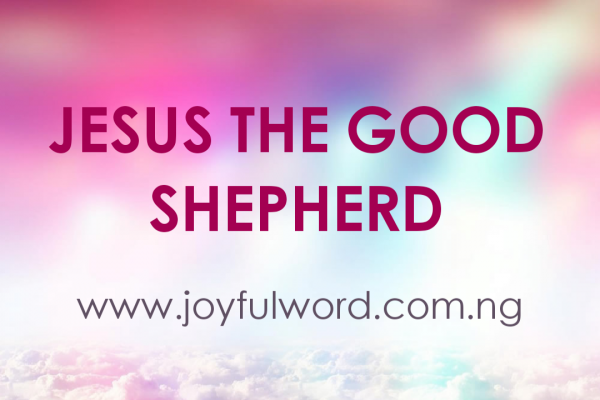WE ARE THE PEOPLE OF THE LORD, THE FLOCK THAT IS LED BY HUS HAND(Acts 13:14,43-52/Psalm 100:1-2,3,5/Revelation 7:9,14-17/John 10:27-30)
WE ARE THE PEOPLE OF THE LORD, THE FLOCK THAT IS LED BY HUS HAND(Acts 13:14,43-52/Psalm 100:1-2,3,5/Revelation 7:9,14-17/John 10:27-30)

WE ARE THE PEOPLE OF THE LORD, THE FLOCK THAT IS LED BY HIS HAND
(Sunday, May 12, 2019 Fourth Sunday of Easter)
With the Fourth Sunday of Easter, we are invited to look upon Jesus as the Good Shepherd who gives us eternal life. Traditionally this Sunday is also dedicated to the prayer, care and support of vocations, especially to the ordained ministry and religious life.
The theme of a shepherd is quite present in Sacred Scripture. Moses and David, both prominent personalities in the Old Testament, were shepherds. Moses met God and received his vocation whilst looking after the flock of his father in law Jethro (Cf. Ex 3). David also received his vocation and anointing as king whilst he was busy looking after the flock of his father Jesse (1 Sam 16:11). In some societies being a shepherd does not carry much prestige as it is a “smelly” profession. Even for the ancient Egyptians, it was simply an abomination to follow animals (Cf. Gen 46:34).
It is worth recalling that being a shepherd requires a lot of commitment as animals need daily care. There is no holiday in this profession. Jesus chooses to reveal himself to both his enemies and followers as a shepherd. Moreover, the first receivers of the good news of the birth of Jesus were shepherds (Lk. 2:8-20). In a way, we can say that God has raised this profession to some nobility and uses it as a metaphor for those called to ministry in the Church. All those called to ministry are invited to show the commitment of a shepherd as they minister to God’s people. Last Sunday we saw Simon Peter commissioned to take up the pastoral office (‘Feed my lambs; feed my sheep’) previously exercised by the Good Shepherd Himself.
The Gospel for today carries on from that commission in that it portrays the members of the community as ‘sheep’ belonging to the flock of the Risen Lord. As members of the Christian Community, we are called to listen to the Shepherd’s voice constantly addressing us in the Scriptures and the sacramental life of the Church. The Good Shepherd, like reliable Palestinian shepherds at the time of Jesus, has intimate knowledge of each one of them – knows their strengths and weaknesses, their capacities and liabilities. This leads to trust and readiness to follow whenever and wherever the Shepherd calls.
The image begins to move in a fresh direction when Jesus presents Himself as the one who gives the sheep ‘eternal life’. In the Fourth Gospel, ‘eternal life’ refers to human participation in God’s own eternal being and communion of love (1:4, 12-13) – something that begins here and now. Since it is indeed the life of God, it will ensure that the flock will not be lost (from eternal life) or stolen from the Good Shepherd. The first reading recalls the commitment of Paul and Barnabas in the service of the word of the Lord in spite of the difficulties encountered.
After some resistance to receive the word of the Lord among the Jews they turn to the pagans. Already we see the posture of a shepherd who is not just interested in the flock that is in the stable but goes out to seek others and in this case the pagans. The shepherd goes out to look for the lost sheep (Cf. Lk. 15:4-7). The responsorial psalm emphasizes the issue of belonging. “Recognize that the Lord is God. He made us and we are His. We are His people, the flock of His pasture”. It is important to remember that even those who call themselves shepherds in the Church should also see themselves as members of the flock. In another well-known psalm with David as author we learn that “the Lord is my shepherd.
There is nothing I shall want” (Ps 23:1). The second reading gives some assurance that we will be counted among the Lord’s flock. John sees a huge crowd which cannot be counted. In this crowd are people of every nation, tribe and language. This gives a sense of God’s wish or plan to save all of humanity. These people are standing before the throne and the Lamb, dressed in white clothes and giving praise to God. The emphasis is on the role of the Lamb which stands among them.
This Lamb will be their shepherd and will guide them to the fountains of living water. An interesting thing to note here is the Lamb who becomes a shepherd at the same time. This is Jesus himself whom John the Baptist calls the Lamb of God and he calls himself the good shepherd. The difficulties of this time will not last as God will wipe away all tears. As we journey through Easter, let us pray for more vocations to the various ministries in the Church, especially ordained ministry and religious life.
Let us pray that more people may listen to the word of God and have the courage to follow the Good Shepherd. Lastly, let us set our sights not just on this life but in the life to come in heaven where we will enjoy the gift of eternal life together with the Lamb as we worship God, the one who sits upon the throne.
Let Us Pray: lord Jesus, you are the shepherd of my soul, help me to listen to you always and may I live a good life to your glory. Amen.

